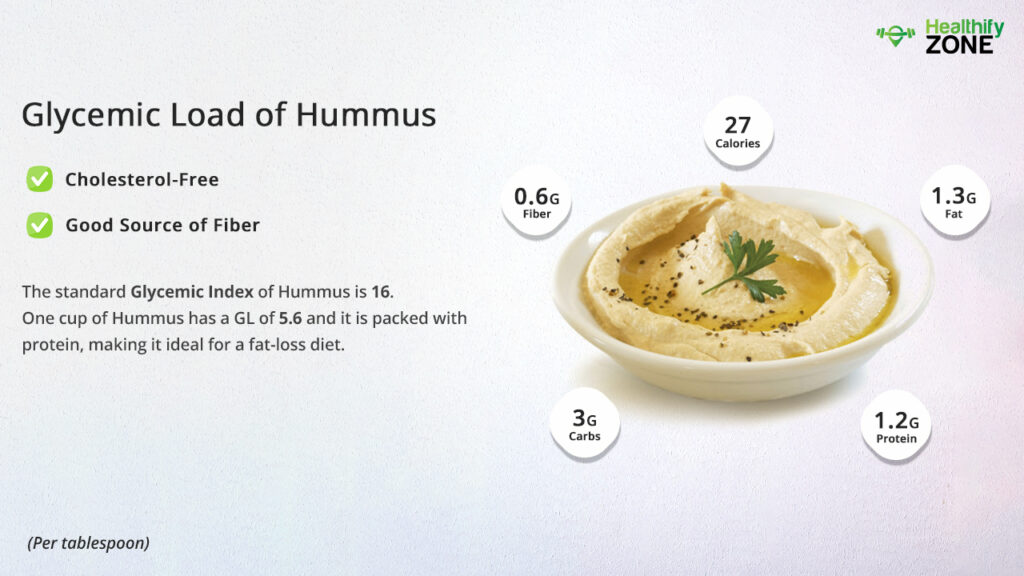The measure of carbohydrate content present in food and its capability to rapidly increase blood sugar levels is called Glycemic Load. A simple way of making healthier dietary choices is using the Glycemic Index. It helps make comparisons and find healthier sources of nutrients according to blood glucose levels. Glucose shows a higher blood glucose response compared to fructose.
Hummus is one of the most famous and versatile dishes from the Middle East. It is prepared using chickpeas, tahini, olive oil, garlic, and lemon juice. It is absolutely delicious, packed with nutrients, and has a variety of health benefits to offer. It is a great source of plant-based protein and provides 7.9 g per serving. The International GI shows that hummus has a GI of 16, which means that it barely causes an increase in blood sugar levels.

Hummus is packed with plant-based proteins and so many nutrients like-
- Fiber
- Manganese
- Copper
- Folate
- Magnesium
- Phosphorous
- Iron
- Zinc
- Thiamine
- Vitamin B6
- Potassium
How to Calculate Glycemic Load of Hummus?
The standard Glycemic index of hummus is 16. The low glycemic index of hummus helps in reducing the risks related to chronic diabetes. If we want to talk about diet, the key to prevent diabetes or any chronic illness is to distribute the carbohydrate consumption content throughout the day and manage the sugar levels in the body correctly—with very low amounts of carbohydrate and a low GI index; hummus is an ideal dip for any kind of meals.
The Formula/Procedure For Calculation of Glycemic Load of the Hummus :
GL = GI * carbs / 100
where
- GL – glycemic load;
- GI – glycemic index;
- and carbs – the amount of carbohydrates in the portion.
| SL.NO | HUMMUS BY WEIGHT IN (g) | GLYCEMIC LOAD |
| 1. | 50 g of Hummus | 1.12 (very low) |
| 2. | 100 g of Hummus | 2.24 (very low) |
| 3. | 200 g of Hummus | 4.48 (low) |
| 4. | 250 g of Hummus | 5.6 (low) |
| 5. | One Tablespoon of Hummus | 0.33 (very low) |
| 6. | 1 Cup of Hummus | 5.6 (low) |
Is Hummus Safe to Consume If You Have Diabetes?
Hummus is packed with properties that help people control their blood sugar levels. The primary ingredient in hummus is chickpea, which has a very low GI; thus, it does not cause much increase in blood sugar levels. Given that it has a low GI value, it is very slowly digested and then absorbed, which leads to a slower and more balance rise and fall in blood sugar levels. Also, it contains soluble fiber and healthy fats.
Can I Eat Hummus During a Fat-Loss Diet?
You can have hummus on a strict fat-loss diet. You can get some 200 g of hummus with some vegetables or with pita and falafel.

- Hummus contains several properties that can help promote weight loss.
- Hummus has dietary fiber, which boosts levels of fullness and reduces hunger.
Can I Eat Hummus During a Low-Carbohydrate Diet?
You can eat hummus during a strict low-carb diet. However, it is necessary to be careful with the portion size. We suggest you not consume more than 200 g of hummus per serving.
Is Hummus High in Sugar?
100 g of hummus has 14 g of carbs and 0.3 g of sugar. Hummus is particularly low in sugar and a great addition to your diet. It is nutritious, versatile, easy to make, and include in your diet.